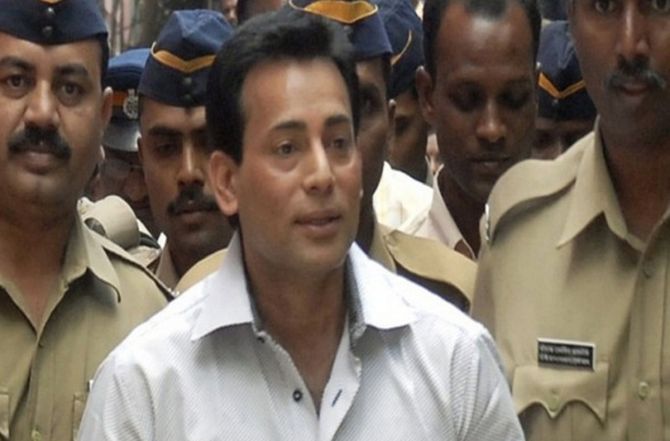The Supreme Court on Wednesday sought response from the Centre on a plea filed by gangster Abu Salem, serving life imprisonment for his role in the 1993 Mumbai serial blasts case, contending that his imprisonment cannot extend beyond 25 years as per the terms of the extradition treaty between India and Portugal.

A bench of Justices SK Kaul and MM Sundresh granted four weeks to the Centre to respond on a plea by Salem claiming that the 2017 judgement of Terrorist and Disruptive Activities (Prevention) Act court sentencing him to life imprisonment was against the terms of the extradition treaty.
Advocate Rishi Malhotra, appearing for Salem, submitted that life imprisonment awarded to Salem is against the assurance given by the Indian government to Portugal from where he was extradited.
The lawyer submitted that even though the TADA court had held that it was not bound by the assurances of the government, the top court has the power to decide the issue.
"Even despite the categorical assurances by the government of India that the appellant will not be sentenced for more than 25 years which assurances formed part of judicial proceedings right till the Supreme Court of Portugal and upon which the extradition order was passed, there was a complete and gross violation by the TADA court when it imposed sentences of life imprisonment for certain offences," the plea said.
On February 25, 2015, the special TADA court had awarded Salem life imprisonment in another case for murdering Mumbai-based builder Pradeep Jain in 1995, along with his driver Mehndi Hassan.
The sentence of another accused in the case, Virendra Jhamb, was set off against the period of detention undergone by him in prison during the various stages of the investigation.
According to police, on March 7, 1995, Jain was shot dead by assailants outside his Juhu bungalow after he allegedly refused to part with his huge property to Salem.
While one other accused Naeem Khan had turned approver, another accused Riyaz Siddiqui, who had also become approver, later turned hostile in the court. The trial of Siddiqui was later separated.
The court, in January 2014, had dropped some charges against Salem in the case on the request of prosecution which said that some changes need to be withdrawn to maintain cordial relations between two sovereign countries -- India and Portugal.
Salem, also a convict in the 1993 Mumbai serial blasts, was extradited from Portugal on November 11, 2005, after a prolonged legal battle.
The Supreme Court of Portugal, in 2012, had dismissed an appeal of the Central Bureau of Investigation which had challenged the termination of his extradition.
In June 2012, Salem was shot at in Taloja Central Jail in Navi Mumbai allegedly by gangster Devendra Jagtap alias JD, an accused in the murder case of advocate Shahid Azmi who had represented a 26/11 Mumbai attack accused.
In June 2017, Salem was convicted and later awarded a life sentence for his role in the 1993 serial blast case in Mumbai.
Salem was found guilty of transporting weapons from Gujarat to Mumbai ahead of the blasts.
On March 12, 1993, the country's commercial capital had witnessed an unprecedented attack with a series of 12 bomb explosions that took place one after another in about two hours.
The dastardly attacks had left 257 dead, 713 persons seriously injured, and destroyed properties worth crores.
In 2020, a Portugal court dismissed a plea of Salem claiming that the Indian government had violated the condition of his extradition.











 © 2025
© 2025